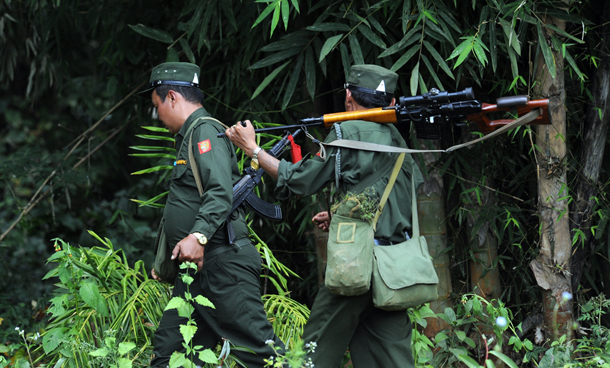RANGOON — More than a dozen lawmakers used Monday’s proceedings at the Union Parliament to discuss whether to sign off on the government’s “nationwide” ceasefire agreement (NCA), with many speakers saying they were reluctant to proceed with the accord until more ethnic armed groups participated.
Three more lawmakers are scheduled to discuss the ceasefire deal, which was signed by the government and eight non-state armed groups in Naypyidaw on Oct. 15. Should the parliament approve the bill, the government will have license to continue discussions with those groups under the terms of political dialogue set out in the agreement.
Many of those who spoke on Monday said they doubted the accord’s ability to end ethnic conflict in Burma, citing the number of groups who had refused to sign.
“It is not easy to ask only the Union Parliament to approve this,” said ethnic Mon lawmaker Nai Bayar Aung Moe. “The majority of strong armed groups did not sign this NCA. Only armed groups who are weak signed it…Indeed, it is not appropriate to use the term ‘NCA’. Only eight armed groups signed it, but there are 21 armed groups in our country.”
San Pyae, an Upper House lawmaker from Kachin State, said that groups who had not signed the ceasefire agreement should still be given the right to participate in future discussions.
“All ethnic leaders should be included in this political dialogue,” he said. “We should even invite other ethnic leaders who do not have armed groups.”
Neither the New Mon State Party (NMSP) nor the Kachin Independence Organization (KIO), two armed groups operating in the states represented by Bayar Aung Moe and San Pyae, were signatories to the Oct. 15 accord. The KIO has faced renewed hostilities from the government since a 17-year bilateral ceasefire broke down in 2011, and fresh attacks on KIO positions have been mounted since the “nationwide” ceasefire agreement was signed.
In central Shan State, the armed wing of the Shan State Progressive Party (SSPP) was subject to a fresh offensive by the Burma Army after the armed group refused a demand to withdraw from a strategic port base by Oct. 6. Clashes have continued since the “nationwide” accord was signed and elections were held on Nov. 8, in which the opposition National League for Democracy (NLD) enjoyed a resounding victory.
May Win Myint, an NLD lawmaker, told the parliament that party leader Aung San Suu Kyi had declined to participate in the ceasefire agreement’s signing ceremony because the majority of ethnic armed groups refused to sign. She added that Suu Kyi had also worried about creating a potential misunderstanding over her intentions among those groups to boycott the agreement, and feared that those who boycotted would come under more pressure from the government.
“We cannot say it is a nationwide ceasefire agreement, because there are other ethnic armed groups that did not sign it,” May Win Myint said. “We want the government and the military to welcome other armed groups who have not signed it yet.”
The government prevented three insurgent groups from participating in the ceasefire accord, despite their representation in the Nationwide Ceasefire Coordinating Team, a body representing the interests of 16 armed groups during negotiations for the agreement.
The exclusion of the Ta’ang National Liberation Army, the Myanmar National Democratic Alliance Army and the Arakan Army were instrumental in leading the KIO and other prominent armed groups from withdrawing their support for the accord.
While many of the speakers on Monday were wary of the agreement’s future, others said that continued political dialogue enshrined in the agreement was a necessary first step in securing a permanent end to ethnic conflict.
“We welcome it. This NCA could help to end conflict and fighting,” said Dwe Bu, a Kachin lawmaker from Lower House, who nonetheless reiterated the need to include more armed groups.
“Our lawmakers and our people want to know how our government will assist other ethnic armed groups to participate in the NCA. It is important that this agreement is all-inclusive. There are some of our Kachin people who have not been able to go back to their homes for 4 or 5 years. We need an all-inclusive agreement so we can stop the fighting in this country.”

















